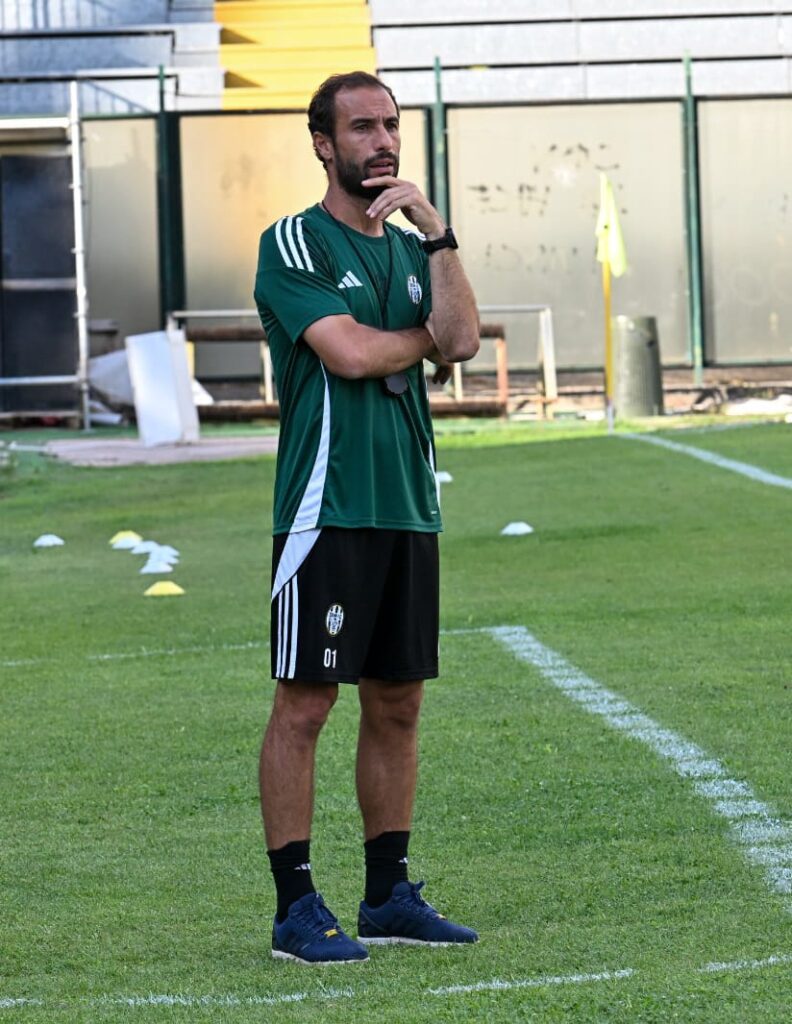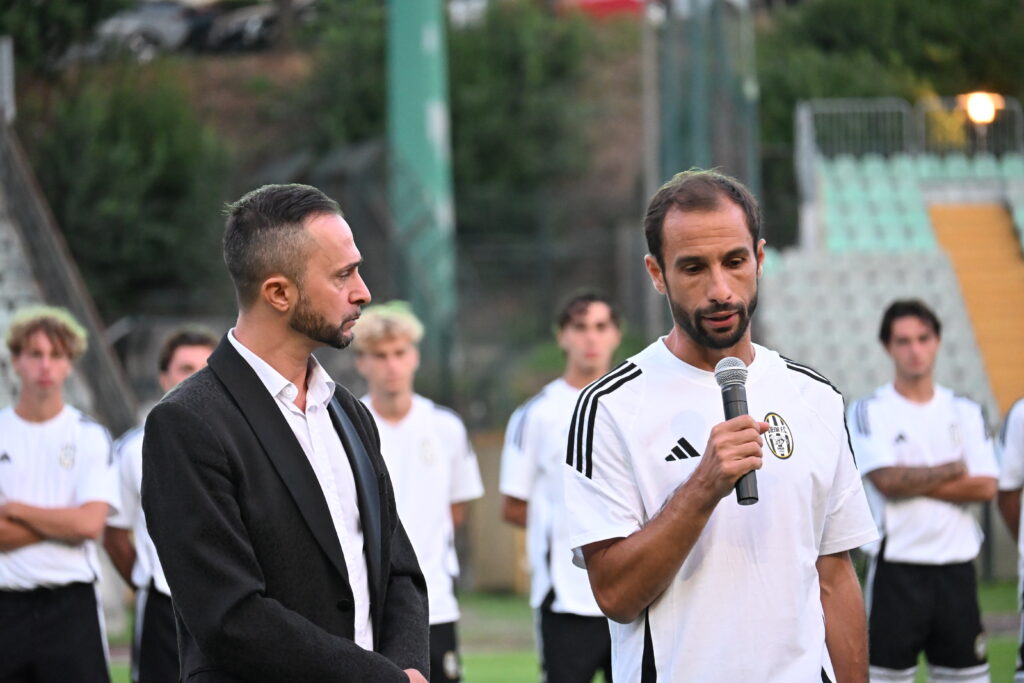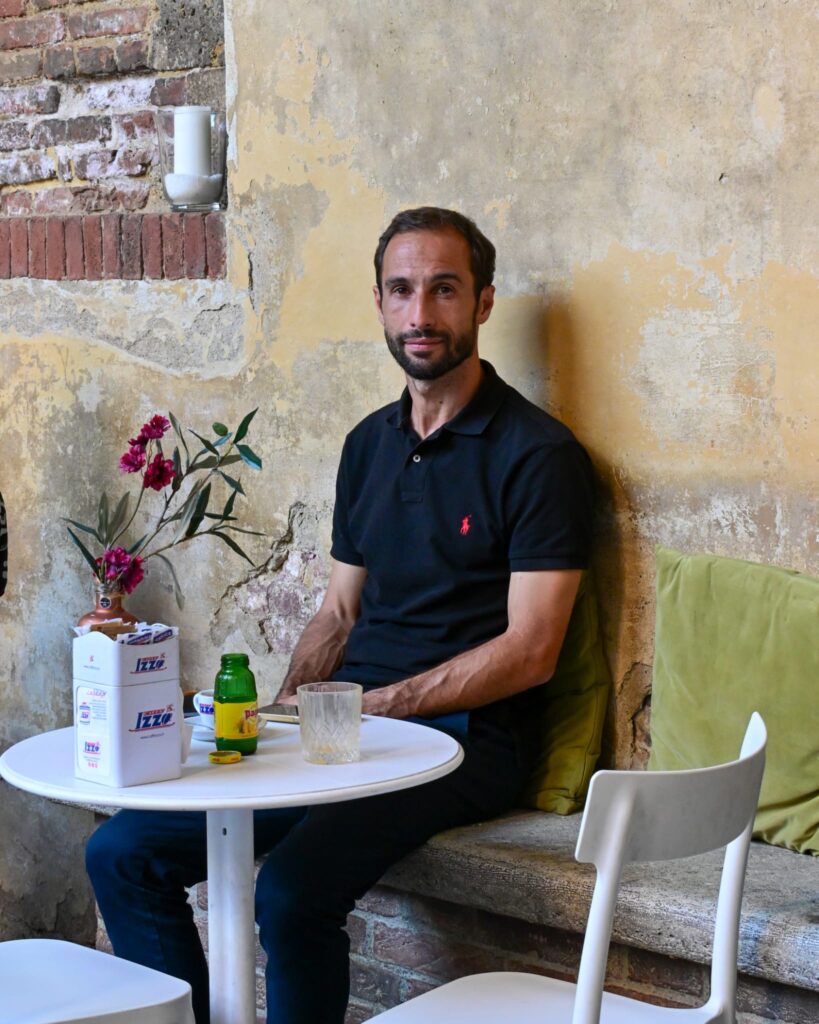
When I ask Tommaso Bellazzini, the new head coach of Siena’s first team, to meet for this interview in a place in the city he particularly likes, I don’t expect him to say the café inside the Chigiana cloister. Not because it’s not a beautiful spot – of course it is – but because of its somewhat hidden location. As soon as we sit down, I immediately ask him why he chose this spot: “A few weeks ago, I happened to have a few hours free and decided to walk around the city center. As I already knew, Siena is truly incredible, but then I wandered into this little corner and found it absolutely wonderful – it really stuck with me.” “Had you ever visited Siena before?” I then ask Tommaso: “I came a few years ago for a long weekend with my partner, touring wineries and cities,” he replies. “I’m a wine lover, and in general I enjoy art cities, so it was the perfect place.”
Tommaso Bellazzini doesn’t have much free time, as for the past few months he’s been tasked with leading the Bianconeri through the new football season. To start, I ask how his connection with Siena began: “I got in touch with the club toward the end of last season because I personally knew the sporting director, Simone Guerri. We had played in the same league and faced each other as rivals, and years ago we were even teammates in Pistoia. At the end of last season, he reached out to me on behalf of Siena, and we started exploring whether there was room to move forward with negotiations. The discussions with the club took time from an organizational standpoint, but once the official offer arrived, my decision to accept the job in Siena was almost immediate.” I then ask what made him decide so quickly: “Definitely the relationship with Simone Guerri, whom I know to be a fair and trustworthy person, and also the conversations with the Swedish presidents, who presented a broader and more forward-thinking vision. Their long-term approach – quite uncommon for this level – combined with the prestige of the club, immediately drew me to this new opportunity. I needed to hear those things, because moving to Siena isn’t just a personal choice for me: I’m bringing my whole family, so I had to find the right place and the right environment for them too. Siena immediately felt like the kind of place where we could all grow – my partner and the kids included.”

And we have to keep talking about Siena, because I found out that just this August, the coach experienced the Palio in Piazza for the very first time. So I ask him what his impressions were: “I obviously knew about the Palio, but seeing it from such a privileged spot – on the top floor of a building in Piazza del Campo – was something incredible. I could really feel the tension of the mossa. That silence, followed by a minute and a half of pure roar, was something I’ll never forget. But what impressed me even more, I have to say, was coming down and seeing people’s faces up close: the joy on the faces of the contradaioli – adults, the elderly, and children – is something I think will stay with me for the rest of my life.” He also adds, truth be told, that when he heads into the city center to visit his assistant coach, Nico Lelli, he often ends up stopping to watch the contrade processions [the so-called giri] and every single time, he finds himself fascinated all over again.
So I can’t help but ask him more about his relationship with Nico Lelli, a familiar face to the Siena fans for having already served as assistant coach during the 2022/2023 season alongside Guido Pagliuca. “Nico and I,” Tommaso explains, “are both from Pisa, and we had crossed paths before because we used to hang out at a place where a lot of people from the sports world gathered. But at the time, we were in very different phases of life, and there weren’t really the conditions to work together – even though he had actually been looking for an assistant coach since the beginning of that year.” You should know that we come from two very different paths: I was a professional footballer until I was thirty-four, while he, who is younger than me, started coaching very early without having a professional playing career behind him. The year we met, there weren’t the conditions to work together officially, but we often kept in touch or met up to discuss and analyze his matches. So, in fact, we were already starting to collaborate informally. Then, in January of that year, his assistant left, and by a strange coincidence, my contract at Coverciano had ended. So we were finally able to start working together on the field, and he immediately recognized in me an added value – probably due to my greater experience both as a player and in terms of age. Beyond the professional aspect, we developed a deep friendship that extended to our families as well. That’s why, by the end of that season, we both understood we would work together again in the future. Later, he went to Montevarchi, and I took charge of Ghiviborgo’s first team. We had our own seasons, faced each other as rivals, and at the end of the year, the opportunity to work together came up again. For me, it was an extraordinary privilege that he accepted to be my assistant, especially since he turned down other important head coach positions to do so. Overall, I’m very proud to have him with me, but that’s not just about him – I have many truly top-level people on the staff”.
I then ask Tommaso Bellazzini what he was doing at Coverciano, and he tells me that his playing career ended negatively, after reaching such a level of stress that made it impossible for him to continue. He had already decided, he says, that once his playing career was over, he would dedicate some time to research and the broader theory of sport. That’s why he was studying at Coverciano, waiting to understand which path to take next in his life. “You’ve always had these two needs – playing football and reflecting on football,” I ask Tommaso, “even while you were a player?” “Yes,” he replies, “and that wasn’t always a good thing. I often found myself overthinking, trying to understand why the coach made certain choices, the deeper reasons behind some actions. It drained a lot of my energy as a player.” I tell him that, in a way, he was already a coach. Tommaso agrees – there was probably a fine line in his life, an inclination that naturally led him to this profession. So when I ask if, despite his young experience as a coach, he feels this is the right role for him, he answers without hesitation: yes.
Tommaso tells me football has been part of him since his earliest memories: “Like all kids who truly love football, I was literally obsessed – I slept with the ball in bed, played against the wall until my mom called me back inside, put my sister in goal and kicked like crazy, walked to school with the ball and did my own commentary. I supported Milan because my dad was a Milan fan. But then, becoming a professional footballer changes things – you start living football from the inside, you get to know it, you think about it, and in the end you watch it less and support it even less.” “Do you think that’s a loss? Something negative?” I ask. “No,” he replies, “I wouldn’t say that. It’s professional deformation – a love that simply changes, maybe becoming deeper, less emotional and more intellectual.” I ask if his family was an obstacle in this process: “I’m incredibly lucky,” he says, “because my family comes from a very intellectual background: my mom taught Latin and Greek at a high school, my dad is a nuclear physics researcher, and my brothers are either mathematicians or studied ancient literature… so I was the odd one out. But they were great in letting me follow my dream, while also teaching me the importance of study and preparation in a broader sense.” “Do you think you’ll do the same as a father?” I ask. “Certainly,” he answers confidently.

It becomes clear after a while talking with Tommaso Bellazzini that there are two main pillars in his life: work, meaning football, and family. I ask him if that’s the case: “Yes, you’ve probably noticed that I’m a passionate person in the truest sense. I’m lucky because the work I do is my passion – but it’s precisely because it’s an all-consuming job where I put everything I am. The same goes for family; those are the two things I give my all to, clearly in different ways and forms. I give everything, I get tired, I struggle, but it’s because I strongly believe the most beautiful things are the hardest ones. So that’s fine: the effort, the tension, the pressure of my job are the price I pay for what I have today and what I try every day to keep with all the passion I can. I’ll make mistakes, both as a coach and as a father, surely, but I want to be able to say that I gave it my all.”
I don’t find it hard to believe him, because even as he speaks, Tommaso makes a clear effort to express himself with millimetric, almost obsessive precision. You can tell he grew up in an environment where not only thinking is important, but thinking well– with depth and care – is crucial. I move toward the end of the interview, asking about his new team: “I’m a pain in the neck, to say the least, I know, and I’m sure they all think so. Clearly, we’ve only been working together for about a month and a half, but I want to slowly build a relationship that I believe is essential to creating conviction and engagement. It’s a tough job because you have to relate differently to individuals and the team as a whole. My ambition is to bring out the best in them, so I need to get to know them better and better. It’s really hard work, but I believe that’s where everything lies. I realize I stress them a lot, but I think it’s important to push people to their limits because often they don’t want to do it themselves. And to reach those limits, you need courage and not to back down... as they say, whatever it takes, no?”.
I don’t know what journey awaits Tommaso Bellazzini and his team this season, but I can swear I’ve rarely seen someone so focused and in love with their work. Whatever it takes..
Aurora Codogno